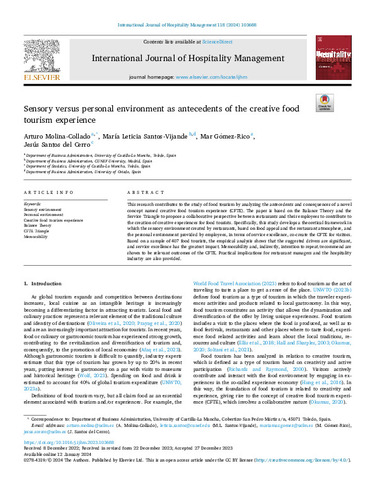Sensory versus personal environment as antecedents of the creative food tourism experience
Autor(es) y otros:
Fecha de publicación:
Versión del editor:
Citación:
Resumen:
This research contributes to the study of food tourism by analyzing the antecedents and consequences of a novel concept named creative food tourism experience (CFTE). The paper is based on the Balance Theory and the Service Triangle to propose a collaborative perspective between restaurants and their employees to contribute to the creation of creative experiences for food tourists. Specifically, this study develops a theoretical framework in which the sensory environment created by restaurants, based on food appeal and the restaurant atmosphere, and the personal environment provided by employees, in terms of service excellence, co-create the CFTE for visitors. Based on a sample of 407 food tourists, the empirical analysis shows that the suggested drivers are significant, and service excellence has the greatest impact. Memorability and, indirectly, intention to repeat/recommend are shown to be relevant outcomes of the CFTE. Practical implications for restaurant managers and the hospitality industry are also provided.
This research contributes to the study of food tourism by analyzing the antecedents and consequences of a novel concept named creative food tourism experience (CFTE). The paper is based on the Balance Theory and the Service Triangle to propose a collaborative perspective between restaurants and their employees to contribute to the creation of creative experiences for food tourists. Specifically, this study develops a theoretical framework in which the sensory environment created by restaurants, based on food appeal and the restaurant atmosphere, and the personal environment provided by employees, in terms of service excellence, co-create the CFTE for visitors. Based on a sample of 407 food tourists, the empirical analysis shows that the suggested drivers are significant, and service excellence has the greatest impact. Memorability and, indirectly, intention to repeat/recommend are shown to be relevant outcomes of the CFTE. Practical implications for restaurant managers and the hospitality industry are also provided.
ISSN:
Patrocinado por:
University of Castilla-La Mancha; European Union through the Eu- ropean Regional Development Fund [2021 -GRIN-31010]; Spanish Ministry of Economy and Competitiveness [PID2019-105726RB-I00]
Colecciones
- Artículos [37550]
Ficheros en el ítem





